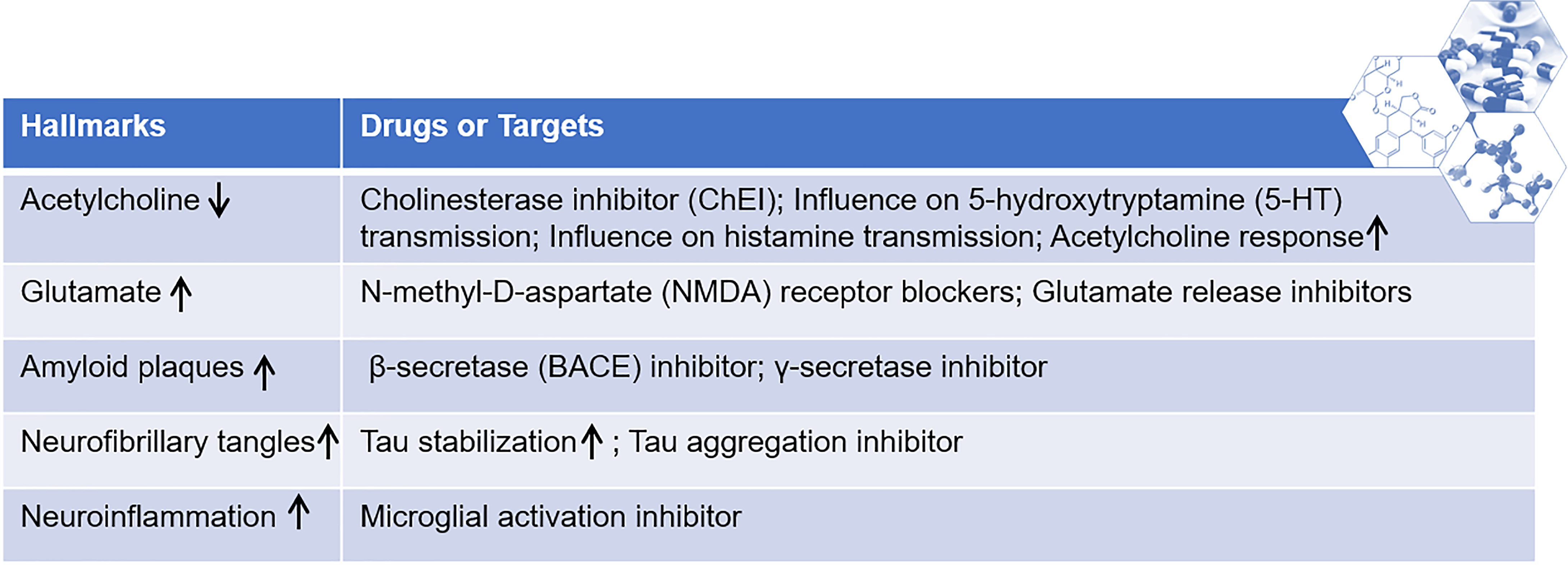Currently, the treatment for patients with Alzheimer’s disease (AD) is mainly symptomatic therapy. AD treatment commonly used drugs cannot curb the progress of dementia but can only delay the deterioration of cognitive function and improve brain function, therefore, these drugs cannot completely cure AD patients. Although pharmaceutical enterprises have maintained a high degree of enthusiasm for the development of AD new drugs, research and development activities of a new drug in this field have a very high failure rate, and in recent years, a series of new drugs entering Phase II or III clinical trials have failed. In addition, this disease lacks objective diagnostic criteria and biomarkers that can be used as clinical endpoints and efficacy criteria, which also poses a great challenge to the development of new drugs for AD. However, this disease is still one of the most active areas of new drug development. Moreover, considering the unmet clinical needs in the field of AD treatment, the FDA and other health administrations have provided strong support for the development of AD new drugs.
Classification of therapeutic drugs or targets in Alzheimer’s treatment
The well-defined risk factors for AD include inflammation, accumulation of reactive oxygen species (ROS), mitochondrial damage, genetic factors, cerebrovascular disease, brain trauma, and age-related sex hormone loss in men and women, and all of these risk factors can be targets for the development of new drugs for AD.
In Alzheimacy, we classify the drugs or targets for Alzheimer’s treatment according to the currently known neuropathologic features of AD. Signature neuropathological changes in AD include acetylcholine deficiency, glutamate excitotoxicity, amyloid plaques, intracellular neurofibrillary tangles formed by tau-protein precipitates, as well as massive loss of neurons.

About Alzheimacy
Alzheimacy is committed to transforming the knowledge about the underlying mechanisms of AD into drugs. As a leading technology company in the life sciences, we provide solutions to key problems in drug discovery and development for AD. We support leaders and scientists from academia, pharmaceutical, and biotechnology companies worldwide in developing Alzheimer’s chemical drugs.
Drug development is a team effort that requires collaboration between scientists in different fields. At Alzheimacy, we connect researchers with drug discovery experts, and drug discovery occurs in networks of biology, chemistry, and in silico simulations, where reassessment and readjustment happen seamlessly in real time.
Basic Research
Alzheimacy considers that the development of Alzheimer’s treatment depends on an in-depth understanding of the pathogenesis of the disease. We utilize our integrated technology platform to advance research on the pathogenesis of AD or basic research on early diagnosis and treatment for this disease. Comprehensive and profound expertise and techniques, such as biochemistry, molecular biology, structural biology, cell biology, immunology, neuropathology, imaging technology, etc., enable us to conduct in-depth basic research.
Pre-clinical Development
Strong preclinical research is critical for predicting clinical success. Leveraging our experience and expertise in both biology and chemistry, we have built an integrated platform for drug discovery and preclinical research. Our comprehensive drug development capabilities include but not limited in target discovery, hit identification, hit to lead, lead optimization, pharmaceutical preparation, pharmacological and pharmacodynamics investigation, pharmacokinetics study, as well as safety assessment.
The development of effective AD therapies is very challenging, and few compounds have shown significant inhibition or reversal of AD progress in clinical trials, primarily due to the lack of druggable targets and reliable biomarkers. Our target discovery and validation tools include cell-based and animal-based phenotypic screening and RNAi and CRISPR screening in physiologically relevant cell lines to advance the discovery of novel drug targets. The structure-based drug design platform helps us screen for the optimal candidate molecules. In addition, we can optimize the structure to meet the requirements of the IND application through preclinical assessment of the efficacy and safety of the candidate drug.
Our integrated approach combines the experience of our scientists, the agility of our teams, and the transparency of our communications to provide a turnkey solution for this most challenging program. If you are interested in doing basic research or drug development in this area, please feel free to contact us. Cooperating with Alzheimacy, you will find everything you need under one roof.